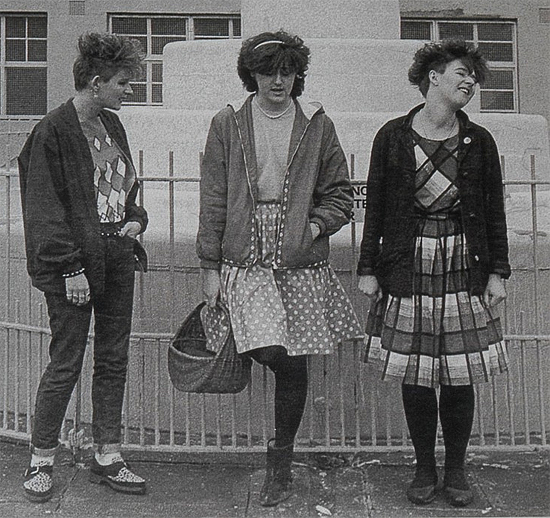In 1994, eleven years after the Marine Girls split up, I was appearing on Later with Jools Holland, performing with Massive Attack. Also on the show that night was Courtney Love with her band Hole. Widely regarded at the time as something of a loose cannon, she was the focus of all attention in the studio that day, and when the bands gathered on their respective sets for the filming there was a sense that all eyes were on her, mine included. Just before the cameras started rolling she looked across to our stage, put down her guitar and strode across the empty central area to crouch down next to me. "Hey", she said, "you’re Tracey from the Marine Girls! Kurt and I were both huge fans of your band" (he was not long dead at this point) – "y’know, Kurt always wanted to do a cover of that song of yours, ‘In Love’. More or less speechless, I managed to mumble something polite in return, before she strode back and the show continued.
At the time I’m not sure I entirely believed her. It was one of those bizarre showbiz encounters that happen from time to time, where things are said, and you’re never quite sure how much of it is true. What I pieced together later was that it was a distant old friend of ours called Calvin Johnson who had carried the Marine Girls’ legacy to Portland, Oregon – first by forming a band almost entirely in our image, called Beat Happening, (whose records he had sent me during the 80s), and then by being part of the label Sub Pop which ultimately signed Nirvana. He had played Beach Party to Kurt and Courtney, along with things like the Raincoats and Kleenex.
The whole unlikely story only finally became real for me when Kurt Cobain’s Journals were published in 2002, and I was able to see for myself, in his own handwriting, our appearance in his many lists of favourite bands. There are the Marine Girls on page 128 and page 241, while on page 77, in a list of his favourite songs, are two of mine, Honey and In Love. Most incredibly, on page 271 Beach Party is listed as one of Nirvana’s Top 50 albums, along with the Sex Pistols, the Clash, and Public Enemy.
Fast forward to May 2010, now a full TWENTY-SEVEN years after the demise of the Marine Girls. I am back on Jools Holland’s Later, this time performing as a solo artist, and also on the show are the current incarnation of all things hip and New York – LCD Soundsystem. I’m sitting watching them set up to do their song, when a member of the band looks up and sees me, strides across to where I’m sitting and says – yeah you guessed it – "I just HAVE to tell you, I have always been such a huge fan of the Marine Girls …"
This is clearly going to be a recurring theme of my life, and it is of course a wonderful thing, and makes me very proud, but it does just beg the question, what on earth is it, or was it, about the Marine Girls that means we cast this long and somewhat unlikely shadow? We only ever really performed a handful of proper gigs, and released two albums, which went on to sell something in the region of 50,000 copies each, and so we might have expected to be forgotten fairly quickly. But in fact the opposite has happened, and in that mysterious late-night obsessive world of the internet we have become a somewhat seminal post-punk DIY band, more revered now than we ever were at the time. Those who loved us, you see, loved us deeply and enduringly, and those who understood the singular nature of the music we made, saw themselves reflected and represented in our refusal to adhere to either mainstream pop or underground rock ‘n’ roll rules. We conducted ourselves as though none of those rules existed, or as if they simply didn’t apply to us, and when I spoke to Alice Fox (singer) recently, she said to me that she thought we were "radical and brave", and I can see what she means.
We used to get up on stage in front of mostly male crowds who’d come to see a rock gig, and we’d quietly but defiantly play our heartfelt songs about boys we loved or boys we despised, mixing in strange and ever-so-slightly random references to the sea. We had no drummer, but hit little wood-blocks, often not in time with each other, Alice and I sang separately, and sometimes together, and not always in tune with each other. But it was artless and sincere, not arch. We made no fetish of our shortcomings, in fact mostly trying our best to overcome them. What you hear on record is the sound of us trying our very best to sound like a band, but most of the time we sounded like nothing and nobody else around. We created an almost magical sense of other-worldliness, hand-built our own little universe, and when audiences were allowed a glimpse of it, often they were entranced.
In all honesty, the Marine Girls were probably one of those bands who could only ever have lasted for a couple of albums. Our split was perhaps the most rock ‘n’ roll thing we ever did, in that in took place in a dressing room, after a fraught gig at which we were heckled, and was not without acrimony. We were very young, so the aftermath was poorly handled by all of us, and it was years before we ever talked to each other about it, and made our peace with the mess we’d made. Still, all that said, there is a kind of perfection in us having split up just when we did, leaving a legacy of a more-or-less entirely uncompromised version of indie-pop.


